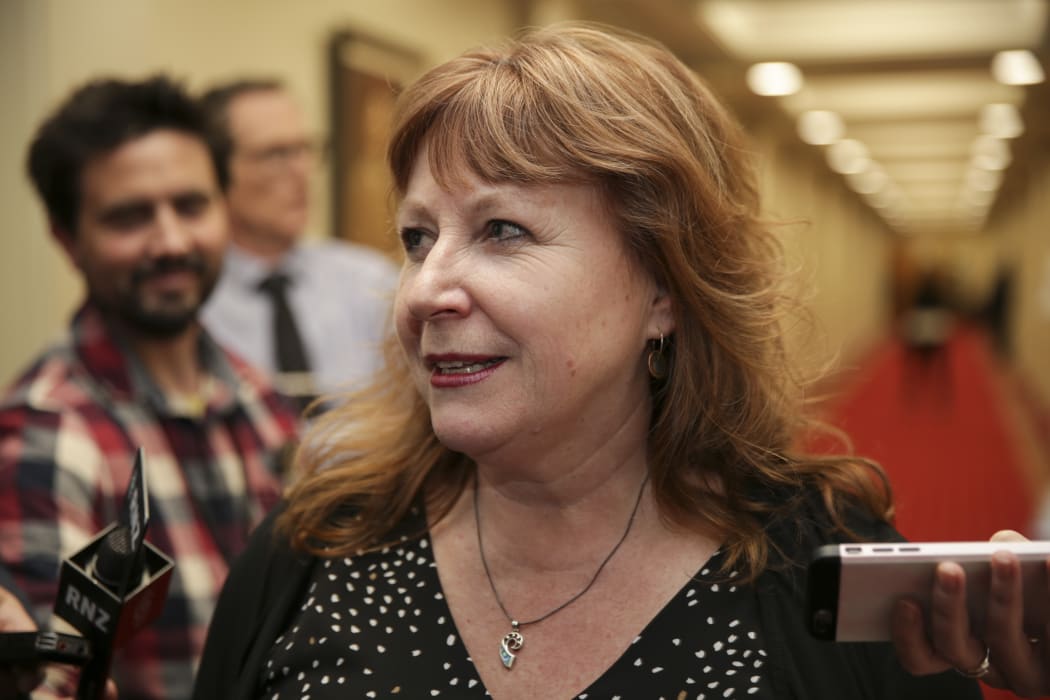The broadcasting minister has appointed advisors to look into funding our public media at arm's length from government. The new TV channel she once wanted seems to be off the table for the foreseeable future, but when will we know who gets the $38 million funding boost promised before the election?

Photo: RNZ / Richard Tindiller
Last Sunday the Minister for Broadcasting, Communications and Digital Media, Clare Curran, made this announcement on Twitter.
Today I announced a (temporary) Public Media Funding Commission to plot the course to an independent & strong public media sector that tells NZ's stories. No matter who u are and wherever u live. Big first step https://t.co/y8tTihipf8
— Clare Curran (@clarecurranmp) February 25, 2018
What was the temporary Public Media Funding Commission she’d announced actually for?
Curran told Mediawatch last year she wants to set up a funding system which could not be easily unpicked by a change of government or policy in future. This is a step towards setting up a body to determine funding for public broadcasting at arm’s length from government.
It was described like this in the cabinet paper released last weekend.
"The Public Media Funding Commission would be an independent and non-political voice for media organisations that are in the inevitable but difficult position of holding to account governments on which they may depend for funding."
The cabinet paper said the four appointees of the interim body will have a budget of $1.4 million and the group will expire in June 2019.
Its terms of reference were also released in a separate digital document last weekend and - like the cabinet paper - it had some of the text concealed by big black blocks.
The blocks didn’t prevent readers from digitally cutting and pasting - and then revealing - the supposedly redacted bits of text. But in the end, these didn't reveal much that the minister hasn’t already made public in policy announcements or interviews.
Labour had already signaled $38m more for the government's broadcasting funding agency New Zealand on Air and RNZ. The cabinet paper showed Curran wants an allocation of that over four years in the 2018 Budget due in May.
After the election, Curran said the bulk of the new funding would be for RNZ+ - "a non-commercial, audio-visual and multi-platform entity with its services expanded to include a free-to-air non-commercial television service ... progressively developed from Radio New Zealand."
The document says NZ on Air and RNZ are both putting together business cases for the funding. Effectively they are competing for it.
Who will decide who gets what if a PMFC may not be formed until 2019? Curran says it will be her call.
"We are in a Budget process so I can't comment on any amounts of money. This is a really new policy area and it is not immediately clear to everyone how it will work. The advisory group will work with RNZ and NZOA on their business plans. In the event of money being made available they will make a recommendation to me," Curran told Mediawatch.
Last October, she told Mediawatch she wanted a full TV channel run by RNZ on Freeview offering more news and current affairs, children's content and drama.
In the cabinet paper she seems no longer wedded to the idea.
"I propose to expand RNZ into a full multi-platform public media service, and also to increase funding for NZ On Air. I am considering options for a public service television channel for a general audience," the paper quotes her as saying.
At RNZ’s annual review at Parliament last Thursday it sounded even less likely that a new fully fledged TV channel run by RNZ is really on the cards.
RNZ's chair Richard Griffin and chief executive Paul Thompson both said RNZ+ will not be a standalone TV channel.
"We have TV channels that we broadcast audio over. At times we have the full television piece. We'll see that grow but it won't be the focus of what we're doing," Thompson told reporters at Parliament.
Has Curran given up on the idea of a new public service non-commercial channel?
"Everybody needs to realise we are at the beginning of an evolution of a transition from RNZ to RNZ+ - and that is only a working title. I have said previously that by the end of this year people will notice the difference. That's a bit vague but there will be a difference and I'm not going to be prescriptive about that," she told Mediawatch.
The cabinet paper also mentions state-owned TVNZ.
"The government has, for the time being, asked TVNZ to continue as a fully commercial broadcaster, but its sustainability under this model requires, and will receive, review," it says.
What kind of review? And carried out by whom?
"I'm not signalling any fundamental change for TVNZ at this time. But I am paying close attention to the media environment. A Treasury paper recently talked about 'managed decline'. We are keen for TVNZ to thrive and be sustainable, but in the meantime we expect them to do their job and do it well," Curran said.

